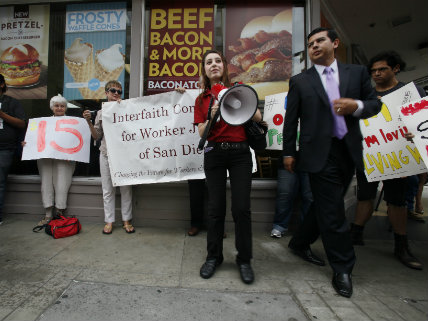San Diego's Experiment With Higher Minimum Wage: 4,000 Fewer Restaurant Jobs
San Diego's restaurant recession is another data point suggesting that making it more expensive to employ people causes fewer people to be employed. Shocker.

California is hiking the statewide minimum wage to $15 per hour by 2023, and San Diego is getting a head start on the higher wage mandate—and, maybe, the consequences of it.
Rather than inch upward from $10 per hour to $10.25 per hour in January 2016, as the rest of the state was doing, San Diego jumped its minimum wage to $11.50 per hour. In the year and three months since then, the number of food service jobs in San Diego has dropped sharply, with perhaps as many as 4,000 jobs lost, or never created in the first place.
"If job growth in the restaurant sector had just kept pace with the state's performance … the industry could have created 5,200 jobs instead of the 1,300 that took place," Lynn Reaser, chief economist of the Fermanian Business & Economic Institute at Point Loma Nazarene University, told Dan McSwain, a columnist with the The San Diego Union-Tribune.
Economists say the restaurant industry is a good barometer for the consequences of minimum wage increases because those businesses rely heavily on low wage workers, operate on small margins, and have high rates of turnover (that is, restaurants tend to pop-up quickly in some areas and go bust just as quickly in others).
That seems to be what's happening in San Diego. While the growth of food service jobs in California has slowed since the higher wage mandates went into effect in 2016, McSwain reports, those jobs have actually dipped into negative growth within the borders of San Diego.
"San Diego's head start, which places many of its employers at a temporary disadvantage, makes the city a test bed for competing theories about whether the overall economy is harmed or helped by large increases to wage floors," McSwain writes.
So far, that test is going about as you'd expect. Restaurateurs are raising menu prices and laying off workers to keep revenue ahead of expenses. McSwain's whole piece is worth a read as it does a fantastic job of breaking down the arcane economic math into real world consequences for small business owners and their employees.
San Diego might be the latest real life test case for the consequences of hiking the minimum wage, but it's hardly alone. Thanks to progressive activists, we're getting a real life economics experiment on a grand scale. In addition to Washington, D.C., local officials in Seattle, Los Angeles and New York have approved laws mandating $15 per hour. Whole states are following suit, with measures already passed in California, New York and Oregon.
It's no secret what will happen after these laws take effect.
"Economically, minimum wages may not make sense," admitted California Gov. Jerry Brown just moments before putting his name on a bill that could cause disastrous economic consequences for the already-impoverished rural parts of his state. "A $15-an-hour national minimum wage would put us in uncharted waters, and risk undesirable and unintended consequences," wrote Alan Krueger, a former chairman of President Obama's Council of Economic Advisers, in the New York Times last year.
San Diego's decline in restaurant jobs might be a blip based on a small sample size or caused by some other factor, but there's no doubt that it's part of an emerging trend in cities where minimum wage hikes have been enacted.
Like Washington, D.C., where restaurants shed 1,400 jobs during the first six months of 2016, following an increase in the city's minimum wage. Meanwhile, restaurants in the Maryland and Virginia suburbs added 2,900 jobs during the first six months of the year.
"Despite what we hear from unions, the Fight For 15 crowd and other minimum wage advocates, the evidence from D.C.'s restaurant industry—an industry often considered as 'ground zero' for minimum wage effects—demonstrates that demand curves for low-skilled workers actually do slope downward," Mark Perry, an economist at the American Enterprise Institute, a free market think tank based in D.C., told me at the time, referring to the basic law of economics that says demand for a product or service will decrease as the cost increases.
Perry took to Twitter this week to highlight a sharp decline in restaurant jobs across the whole country.
US Restaurant Job Growth Fell to a 6-Year Low in March. Are Minimum Wage Hikes (and Threats) Causing a Restaurant Recession? pic.twitter.com/nZfAGZl4jO
— Mark J. Perry (@Mark_J_Perry) April 7, 2017
Even if it's only a small part of the reason, the economic data should start to worry city and state officials who have backed radical minimum wage hikes over the coming years.
Perhaps more officials will do what Baltimore Mayor Catherine Pugh did earlier this month. Though she had supported a higher minimum wage during last year's campaign, Pugh decided to veto a proposal to set a $15 per hour minimum wage in Baltimore, citing concerns raised by businesses and nonprofits in the city.
The Wall Street Journal reports this week that four municipalities in Cook County, Ill., have opted out of the county government's move to raise the minimum wage in the Chicago suburbs to $13 an hour by 2020. Iowa Gov. Terry Branstad, a Republican, approved legislation in March to roll back higher minimum wages already approved in four counties. In Flagstaff, Ariz., council members just amended a minimum-wage increase approved by voters in November to slow the pace of increases.
The populist left led the push for upping the minimum wage—initially calling for $10.10 per hour, which quickly ballooned to $15 per hour—during the latter half of the Obama administration. Minimum wages going up, though, is pushing employment opportunities down.
San Diego's restaurant recession is another data point suggesting that making it more expensive to employ people causes fewer people to be employed. Sometimes it's really that simple.


Show Comments (141)